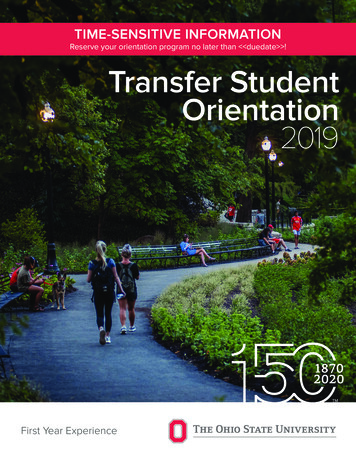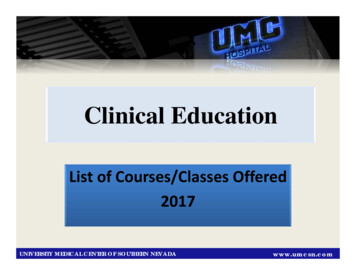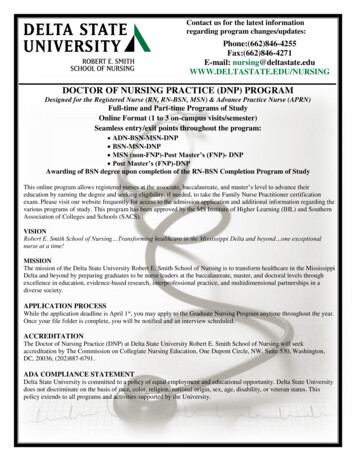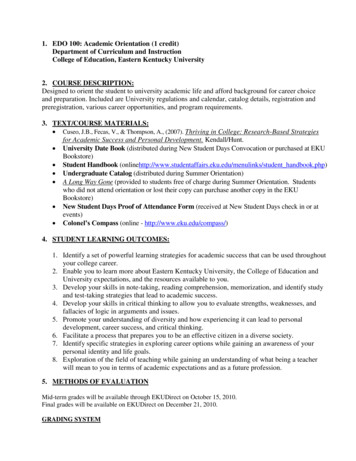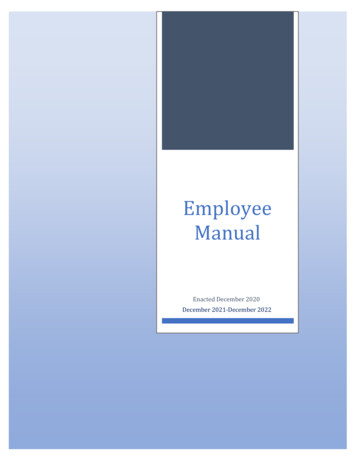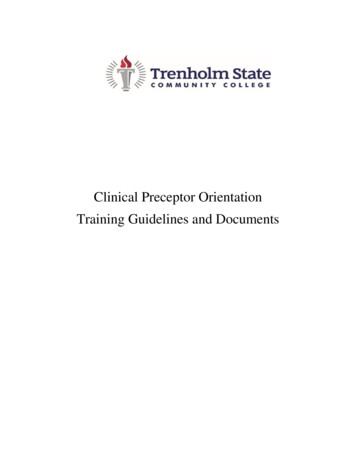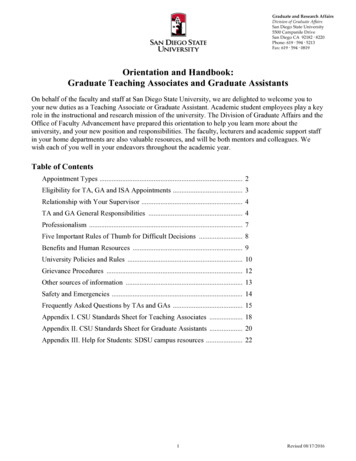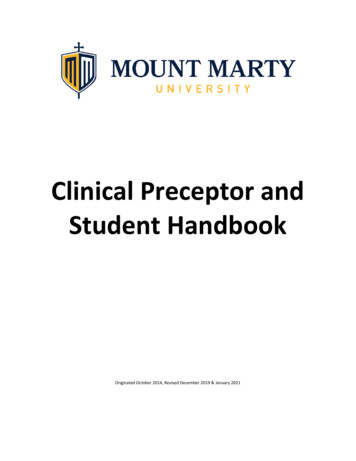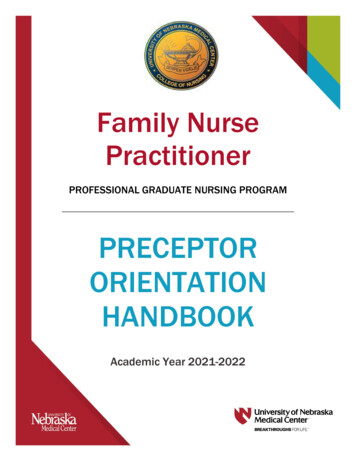
Transcription
Family NursePractitionerPROFESSIONAL GRADUATE NURSING PROGRAMPRECEPTORORIENTATIONHANDBOOKAcademic Year 2021-2022
TABLE OF CONTENTSUNMC College of Nursing Contact Information . 1The Role of the Preceptor . 2Preceptor Responsibilities . 2Student Responsibilities . 3Clinical Faculty Responsibilities . 3Preceptor Credentials Form Information . 4Clinical Preceptor Assessment of Student Form . 5-6Family Nurse Practitioner Guidelines and Course Descriptions . 7-12Scope of Practice for Nurse Practitioners . 13Standards of Practice . 14
UNMC College of NursingSpecialty Contact InformationSydney Buckland, PhD, APRN FNP-BCAssistant ProfessorUNMC College of Nursing – Omaha Division985330 Nebraska Medical CenterOmaha, NE 68198-5330402-559-4637 (office)sydney.buckland@unmc.eduKelly Gonzales, PhD, APRN-NP, FNP-CAssistant ProfessorUNMC College of Nursing - Omaha Division985330 Nebraska Medical CenterOmaha, NE 68198-5330402-559-4111 (office)kelly.gonzales@unmc.eduMiranda Kliment, DNP, APRN-NPClinical Assistant ProfessorUNMC College of Nursing – Lincoln Division550 N 19th StreetHCCN – 310KLincoln, NE 68588402-472-7360 (office)miranda.Kliment@unmc.eduSheri A. Rowland, PhD, MSN, APRN-BC FNPAssistant ProfessorUNMC College of Nursing-Lincoln DivisionHCCN550 N. 19th St. Suite 343Lincoln, NE 68588-0620402.472.5959 (office)sheri.rowland@unmc.eduSteph Burge DNP, APRN-BC, FNPClinical Assistant ProfessorUNMC College of Nursing – Kearney DivisionHealth Science Education Complex2402 University DriveKearney, NE 68849 -4510308.865.8745 (office)sburge@unmc.eduKassidy Horst MSN, APRN-NP, WHNP-BC, FNP-CInstructorUNMC College of Nursing-Northern Division801 E Benjamin AvenueNorfolk, NE 68701402-844-7911 (office)kassidy.horst@unmc.eduJill Reed, PhD, APRN-NP, FNP-CAssistant Professor and FNP Specialty CoordinatorUNMC College of Nursing – Kearney DivisionHealth Science Education Complex2402 University DriveKearney, NE 68849 -4510308-865-8150 (office)jrreed@unmc.eduTammy Schroeder, MSN, APRN-NP, FNP-BCClinical Specialist/InstructorUNMC College of Nursing- Lincoln Division Rm 330 J550 N 19th Street,Lincoln, NE 68588-0620(402) 418-4151(cell - preferred)(402) 472-7499 (office)tammy.schroeder@unmc.eduPreceptor Program and Clinical ContractAdministrationNichole BaerClinical Placement CoordinatorOffice: 402-5595469Fax: 402-559-9666nichole.baer@unmc.edu
The Role of the PreceptorThe College of Nursing Graduate Faculty would like to thank you for taking time to be a preceptor for one ofour students. The role of the preceptor is important in shaping the development of a nurse practitioner. Werecognize that it takes time to supervise a student, and we appreciate the additional time you give to eachstudent. As the semester advances, the student will become more accomplished and require less supervisionon your part and should begin to facilitate your client caseload.Expectations of All Preceptors Review semester objectives and goals to facilitate clinical learningReview daily objectives to be discussed at the beginning of each clinical dayCreate a learning environment for the student and facilitate the critical thinking skills required ofastudentComplete the Preceptor Credentials electronic form on our websiteAt https://app1.unmc.edu/nursing/preceptor/, which will allow you to fill out the form onlineAt the end of the semester, complete the Clinical Preceptor Assessment of Student Performanceform and return to designated clinical faculty memberExpectations of Preceptors for APRN Students Listen to the student’s case presentation on each patientProvide feedback about assessments, differential diagnosis, problem lists and proposed plans of careSee patients with the studentSupervise the student on all new proceduresRecheck all abnormal examination findings identified by the student and evaluate the student’smanagement plans for these problemsAlways be present in the clinical area during the student’s experience, and name a qualified substituteif you must leave the clinicReview all student entries in the patient’s health/medical recordsExpectations of Preceptors for Lead/Nursing Executive Students Facilitate student’s skill in completing an organizational assessmentFacilitate student’s development, implementation and evaluation of a clinical project.Engage student in organizational meetings and follow up to share decision-making related to specificagenda itemsDialogue on-going conversations with student related to organizational activities including operationsand strategic initiatives2
UNMC College of NursingRole of the PreceptorDepending on the level of the student (beginning, middle, or advanced), the student will participate alone orwith assistance for performance of the history and physical examinations, ordering necessary lab data,analyzing assessments, proposing appropriate diagnostic and/or therapeutic plans, and documentingencounters. The student should show progress in skill and clinical judgment as he/she proceeds through eachcourse and semester.The preceptor has a right to ask that the student be placed in another learning environment if problems arisethat cannot be resolved.Student Responsibilities Prepare for each clinical experience by Sharing daily objectives with the preceptor at the beginning of the day Studying presentations and diagnoses seen the previous week to build on knowledgeand skills, and Bringing materials learned in the classroom for application in the clinical settingDemonstrate active learning strategies by Appropriate use of printed and electronic clinical resources (brought by student) Asking questions Identifying strengths and weaknesses, and Being proactive in seeking learning opportunities Seek confirmation with the preceptor of any findings of which you may be unsure Ask for assistance with new procedures or learning opportunities Demonstrate evidence of using the clinical experience for advanced learning Dress in appropriate attireClinical Faculty Member Responsibilities Make arrangements with the student and preceptor to visit the clinical site (if feasible) toevaluate the student’s performance at various times throughout the semester Evaluate the student’s performance at mid-term and at the end of the semester(The preceptor will provide input into the evaluation process by completing the ClinicalPreceptor Assessment of Student Performance form)Please contact the student’s clinical faculty instructor with questions, concerns or comments.3
UNMC College of NursingClinical Preceptor Credentials FormThe University Of Nebraska Medical Center College Of Nursing is required by our accrediting agencies andthe State Board of Nursing to document the credentials and professional experience of persons who serveas clinical preceptors with our students. Preceptors must have an advanced practice degree (APRN, MD,DO, PA) and at least one year experience at the advanced practice level. The Preceptor Credentials formis available to complete electronically. The link to register and login to access and complete the formelectronically is listed below. This form will be updated annually.https://app1.unmc.edu/nursing/preceptor/4
UNMC College of NursingClinical Preceptor Assessment of Student PerformanceStudentPreceptorSpecialty AreaPreceptor EmailClinical InstructorCourse NumberClinical Start DateCampusClinical End DateAt the end of the semester, please provide an assessment of the student using the rating scale below. Select the rating thatbest describes the level of expectation achieved by the student this semester. Students will not receive a grade for theirclinical experiences if this 2 page assessment form is not completed and returned to faculty.FarExceededMetDid NotMeetClinicalExpectationNot ObservedNot Applicableto this ClinicalSetting1. Comes to the setting with learning objectivesand discusses them with me.2. Performs a systematic history and physicalexam, focused exam, differential diagnoses,and conclusive diagnoses to my satisfaction.3. Discusses with me common laboratory anddiagnostic tests and rationale for use.4. Discusses pharmacological and nonpharmacological treatments to mysatisfaction.5. Discusses a clinical treatment(management plan) to my satisfaction.6. Formulates a Preventative Health/HealthPromotion Plan to my satisfaction.7. Discusses the pathophysiology of commondiseases.8. Uses research and evidence based practicestandards of care in discussions with me.9. Discusses the need for referrals and followup appointments to my satisfaction.10. Completes concise written and verbalreports to my satisfaction.11. Is professional, on time, courteous,appropriately dressed, and has neededresources.12. Attends to quality care, safety issues, andcultural diversity factors.5
UNMC College of NursingClinical Preceptor Assessment of Student PerformancePreceptor Comments:Preceptor SignatureDatePlease return completed assessment to the clinical instructor at end of semester.6
Family Nurse Practitioner Guidelines for the Clinical ExperienceThe family nurse practitioner clinical experience consists of a minimum of 585 hours over 4consecutive semesters. During each of these semesters, students are expected to have aprimary care provider as their primary preceptor. Of the 585 clinical hours required, 500 ormore hours must be in primary care. Primary care placement can include a family practiceclinic, internal medicine clinic, women's health clinic, pediatric clinic or urgent care. Thesehours are divided among primary preceptorships with family practice specialists (physicians,physician assistants and nurse practitioners) and supplemental preceptorships (specialties).The clinical experience is completed along with didactic coursework.NRSG 637: Health Promotion and Advanced Clinical Skills in Primary Care forIndividuals and FamiliesDuring the first clinical semester, clinical experiences are under close supervision of facultyand preceptors. The focus is on evidence-based methods and guidelines for health assessmentand interventions in the primary care setting. Clinical decision-making skills are utilized toenhance health promotion activities through the use of risk management, disease prevention,screening, and case finding activities across the lifespan. Clinical experiences are used forapplication of health promotion and advanced assessment skills across the lifespan. Inaddition, the role of the advanced practice registered nurse in primary care is analyzed. In thissemester students will be expected to complete history & physicals and focused examinations.All visits should be "staffed" with the preceptor. A general guideline is that students should beseeing and documenting in Typhon an average of 1 patient per clinical hour. In NRSG 637students must complete a minimum of 90 clinical hours.NRSG 639: Primary Health Care of Older FamiliesThis semester the student will be expected to learn how to assess a patient, develop differentialdiagnoses, formulate a plan of care, report findings to the preceptor and then completedocumentation. The student should not be “seeing” all of the patients the preceptor isevaluating. The student should choose patients they can take time with doing the evaluationand treatment plan. A general guideline is that students should be seeing and documenting inTyphon an average of 1 patient per clinical hour. The goal is for the student to start formulatingthe treatment plan and presenting the plan to the preceptor. The focus during this semestershould be on adults with acute minor health problems and stable chronic health problems andwith routine health promotion needs. All visits should be "staffed" with the preceptor. In NRSG639 students must complete a minimum of 135 clinical hours.NRSG 638: Primary Health Care of Younger FamiliesThis semester the student will be expected to continue to learn and grow in assessment andmedical management of the patient. During this semester, the focus should be on individualsfrom age birth to thirty years old including children, well pregnant women, women withgynecologic needs, and young men. This includes acute health problems, stable chronic healthproblems and routine health promotion needs. The student should be seeing more patientsthis semester. A general guideline is that students should be seeing and documenting in7
Typhon an average of 1-2 patients per clinical hour, depending on the complexity. All visitsshould be "staffed" with the preceptor. In NRSG 638 students must complete a minimum of135 clinical hours.NRSG 640: Advanced Primary Health Care of FamiliesThis is the final clinical semester and the emphasis is on synthesis and application of previouscontent in addition to management of more complex patients. Students should be makingappropriate clinical decisions on patients with problems that are within the family nursepractitioner scope of practice. This semester the student will be expected to continue tomanage patients. The student should be feeling more comfortable with the assessment andplan of care. Ample time should be spent on formulating long range plans and healthpromotion/prevention strategies. Students should be seeing patients back for follow-up andknowing what the plan of care is required. The goal of this semester is to work towardmanaging patients more independently. A general guideline is that students should be seeingand documenting in Typhon an average of 1-2 patients per clinical hour, depending on thecomplexity.In NRSG 640, a minimum of 225 hours of clinical experience is required. It is highly encouragedthat some of the hours in NRSG 640 be completed in “blocks” of time that involves followingthe primary preceptor’s schedule. If the preceptor has a typical full-time schedule, then thestudent will complete a full-time week and be at the clinical site every day the preceptor isthere. If the preceptor has a part-time schedule, then the student will complete two part-timeweeks and will be at the clinical site every day the preceptor is there for a total of two weeks,which do not need to be completed in succession. The purpose of this is for the student to gainexperience with managing follow up, and seeing the daily clinic routines, which is often notpossible when the student is in clinical just one day per week.8
Semester INRSG 637: Health Promotion and Advanced Clinical Skills in Primary Care forIndividuals and FamiliesAssessment and interventions for risk management, disease prevention, and case findingsfor individuals and families across the lifespan.PREREQUISITE COURSES: Admission to the Professional Graduate Nursing Program orpermission of the instructor. Twelve months of recent full time clinical experience perCON policy.CREDIT ALLOCATION: 5 credits (3 didactic/2 clinical)CLINICAL OBJECTIVES OF COURSE1. Analyze the nature and scope of primary, secondary, and tertiary prevention.2. Describe the role of the advanced practice register nurse in primary care.3. Develop a plan of action for risk management, disease prevention and health promotionacross the lifespan.4. Understand the scientific basis for the use of preventive services guidelines as acomponent of evidence-based practice.5. Evaluate and implement health promotion interventions including health maintenanceschedules, risk reduction and education strategies across the life span.6. Integrate clinical, ethical, theoretical, and research literature into health promotion.7. Conduct and document comprehensive, problem focused assessments and healthpromotion strategies for individuals across the lifespan.8. Apply tools for the evaluation of individuals and families.9. Create and implement holistic problem lists utilizing clinical decision making across thelifespan.During their clinical time students should:1. Obtain H and P’s on patients across the lifespan focusing on Health Promotionstrategies and disease prevention.2. Utilize assessment data to make appropriate differential diagnosis3. Review treatment plans suggested by the preceptor reviewing both pharmacologicaland non-pharmacologic interventionsExamples of types of visits you may see include: children and adults who present for routine physical exams children and adults who present for annual check-ups children and adults who present for health promotioncounseling children and adults who present for basic episodic care older adults who present for nursing home checks9
Semester IINRSG 639/839 Primary Health Care of Older FamiliesKnowledge and skills for providing primary health care to middle-aged and older families. Focus is onrisk management and care of acute and chronic illnesses.PREREQUISITE COURSES: NRSG 637/837 or permission of instructor.CREDIT ALLOCATION: 3 - 6 credits (3 didactic/0 - 3 lab)CLINICAL OBJECTIVES OF COURSE1.2.3.4.Assess, diagnose and manage common illnesses of middle-aged and older adults.Assess and monitor stable chronic illness of middle-aged and older adults.Assess and manage the health care of well middle-aged and older adults.Evaluate the process, outcomes and cost effectiveness of primary health care provided to middle-aged andolder adults and their families.Utilize consultation and referral within the health care team to assure optimal outcomes.Coordinate primary health care services, including community services, middle-aged and older adults andfamilies.Integrate clinical, ethical and theoretical and research literature into the primary health care of middleaged and older adults and their families.Interpret the role of nurse practitioner to clients, families, the primary health care team and thecommunityBase clinical decisions on an understanding of the relationship between selected psychiatric-mental healthproblems and physical illnesses.5.6.7.8.9.DURING THEIR CLINICAL TIME, STUDENTS SHOULD: Obtain focused histories and exams for adults with acute minor and stable chronic illnessesMake an appropriate differential diagnosisDevelop a treatment plan including pharmacological and non-pharmacological therapyIdentify appropriate follow-upExamples of types of visits for which the student should be scheduled include: Adult with upper and lower respiratory symptomsAdult with urinary tract complaintsAdult with Type 2 DMAdult with hypertensionMidlife woman experiencing perimenopausal symptoms11
Semester IIINRSG 638/838 – Primary Health Care of Young FamiliesKnowledge and skills for providing primary health care to children and childrearing families.PREREQUISITE COURSES: NRSG 637/837 or permission of instructor.CREDIT ALLOCATION: 3 - 7 credits (3 didactic/ 3 or 4 lab).CLINICAL OBJECTIVES OF COURSE1.2.3.4.5.6.7.8.9.Assess, diagnose and manage common illnesses of children and young adults.Assess and monitor stable chronic illness of children and young adults.Assess and manage the health care of well children and low risk pregnant women.Evaluate the process, outcomes and cost effectiveness of primary health care provided to children andchildbearing families.Utilize consultation and referral within the health care team to assure optimal outcomes.Coordinate primary health care services, including community services, for children and childbearing families.Integrate clinical, ethical and theoretical and research literature into the primary health care of childrenand childbearing families.Interpret the role of nurse practitioner to clients, families, the primary health care team and thecommunity.Base clinical decisions on an understanding of the relationship between selected psychiatric-mental healthproblems and physical illnesses.DURING THEIR CLINICAL TIME, STUDENTS SHOULD:Obtain focused historiesPerform focused examinationsMake appropriate differential diagnoses of women and childrenDevelop a treatment plan including pharmacological and non-pharmacological therapyIdentify appropriate follow-up Examples of types of visits for which the student should be scheduled include: Child with an earachePremenopausal woman with vaginal symptomsRoutine pre-natal visitsWomen with family planning needs10
Semester IVNRSG 640/840 – Advanced Primary Health Care of FamiliesThis is the final clinical semester and the emphasis is on synthesis and application of previous content inaddition to management of more complex patients. Students should be making appropriate clinicaldecisions on patients with problems that are within the family nurse practitioner scope of practice.Comprehensive primary health care is provided to individuals and families across the lifespan. Didacticcontent addresses advanced nursing practice issues and policies affecting delivery of primary healthcare. PREREQUISITE COURSES: NRSG 638/838, NRSG 639/839 or permission of instructor.CREDIT ALLOCATION: 3 - 5 credits (2 - 5 lab).CLINICAL OBJECTIVES OF COURSE1. Analyze the nature and scope of primary, secondary, and tertiary health care as provided by theadvanced practice registered nurse.2. Describe legal, regulatory, and professional forces affecting the role development of the advancedpractice registered nurse in primary care.3. Using case studies and interacting with experts from multiple care disciplines synthesizemultidisciplinary knowledge to optimally manage the complex health care needs of patients.4. Provide comprehensive primary health care for individuals and families within the scope of practice for nursepractitioners.5. Evaluate the structure, process and outcomes of primary health care and advanced nursing practice basedupon standards of practice.6. Analyze the effects of selected national and regional health policies on primary health care, particularly asprovided by a nurse practitioner.7. Interpret the role of the nurse practitioner to prospective employers and health policy makers.8. Identify the components of a contract and the negotiating methods used for obtaining desiredconditions of employment.9. Write a business plan that demonstrates understanding of the entrepreneurial process and the nature of thebusiness of health care.10. Analyze process of payment for health care services, including federal and third party payer program, as itimpacts on nurse practitioner practice.11. Demonstrate the ability to bill properly for nurse practitioner services.12
Scope of Practice for Nurse PractitionersProfessional RoleNurse practitioners (NPs) are licensed, independent practitioners who practice in ambulatory, acuteand long-term care as primary and/or specialty care providers. Nurse practitioners assess, diagnose,treat, and manage acute episodic and chronic illnesses. NPs are experts in health promotion anddisease prevention. They order, conduct, supervise, and interpret diagnostic and laboratory tests,prescribe pharmacological agents and non-pharmacologic therapies, as well as teach and counselpatients, among other services.As licensed, independent clinicians, NPs practice autonomously and in coordination with healthcare professionals and other individuals. They may serve as health care researchers, interdisciplinaryconsultants, and patient advocates. NPs provide a wide-range of health care services to individuals,families, groups, and communities.EducationNPs are advanced practice registered nurses who obtain graduate education, post-master’scertificates, and doctoral degrees. Educational preparation provides NPs with specializedknowledge and clinical competency which enable them to practice in various health care settings,make differential diagnoses, manage and initiate treatment plans and prescribe medications andtreatment. National NP education program accreditation requirements and competency-basedstandards ensure that NPs are equipped to provide safe, high-quality patient care from the point ofgraduation. Clinical competency and professional development are hallmarks of NP education.AccountabilityThe autonomous nature of NP practice requires accountability to the public for delivery of highquality health care. NP accountability is consistent with an ethical code of conduct, nationalcertification, periodic peer review, clinical outcome evaluation, and evidence of continuedprofessional development.ResponsibilityThe patient-centered nature of the NP role requires a career-long commitment to meet the evolvingneeds of society and advances in health care science. NPs are responsible to the public andadaptable to changes in health care. As leaders in health care, NPs combine the roles of provider,mentor, educator, researcher, and administrator. NPs take responsibility for continued professionaldevelopment, involvement in professional organizations, and participation in health policy activitiesat the local, state, national and international levels. Five decades of research affirms that NPs providesafe, high-quality care. American Association of Nurse Practitioners, 1993Revised, 1998, 2002, 2007, 2010, 2013, 2015Reviewed and Revised by the AANP Fellows at the Winter 2015 MeetingAdministration: PO Box 12846 Austin, TX 78711 512-442-4262 Email: admin@aanp.org Website: www.aanp.orgGovernment Affairs: 225 Reinekers Lane, Suite 525 Alexandria, VA 22314 703-740-2529 Email: governmentaffairs@aanp.org
StandardsofPracticeforNursePractitionersI. QualificationsNurse practitioners are licensed, independent practitioners who provide primary and/or specialty nursing andmedical care in ambulatory, acute and long-term care settings. They are registered nurses with specialized,advanced education and clinical competency to provide health and medical care for diverse populations in avariety of primary care, acute and long-term care settings. Master’s, post-master’s or doctoral preparation isrequired for entry-level practice (AANP 2006).II. Process of CareThe nurse practitioner utilizes the scientific process and national standards of care as a framework for managingpatient care. This process includes the following components.A. Assessment of health statusThe nurse practitioner assesses health status by: Obtaining a relevant health and medical history Performing a physical examination based on age and history Performing or ordering preventative and diagnostic procedures based on the patient’s age and history Identifyinghealthand medicalriskfactorsB. DiagnosisThe nurse practitioner makes a diagnosis by: Utilizing critical thinking in the diagnostic process Synthesizing and analyzing the collected data Formulating a differential diagnosis based on the history, physical examination and diagnostictest results Establishingpriorities to meetthehealthandmedicalneedsoftheindividual, family, orcommunityC. Development of a treatment planThe nurse practitioner, together with the patient and family, establishes an evidence-based, mutuallyacceptable, cost-awareness plan of care that maximizes health potential. Formulation of the treatmentplan includes: Ordering and interpreting additional diagnostic tests Prescribing or ordering appropriate pharmacologic and non-pharmacologic interventions Developing apatient education plan Recommending consultations or referrals as appropriateD. Implementation of the planInterventions are based upon established priorities. Actions by the nurse practitioners are: Individualized Consistent with the appropriate plan for care Based on scientific principles, theoretical knowledge and clinical expertise Consistent with teaching and learning opportunitiesE. Follow-up and evaluation of the patient statusThe nurse practitioner maintains a process for systematic follow-up by: Determining the effectiveness of the treatment plan with documentation of patient care outcomes Reassessing and modifying the plan with the patient and family as necessary to achieve health andmedical goalsAdministration: PO Box 12846 Austin, TX 78711 512-442-4262 Email: admin@aanp.org Website: www.aanp.org12Government Affairs: 225 Reinekers Lane, Suite 525 Alexandria, VA 22314 703-740-2529 Email: governmentaffairs@aanp.org
III. Care PrioritiesThe nurse practitioner’s practice model emphasizes:A. Patient andfamilyeducationThe nurse practitioner provides health education and utilizes community resource opportunities for theindividual and/or familyB. Facilitation of patient participation in self care.The nurse practitioner facilitates patient participation in health and medical care by providing informationneeded to make decisions and choices about: Promotion, maintenance and restoration of health Consultation with other appropriate health care personnel Appropriate utilization of health care resourcesC. Promotion of optimal healthD. Provision of continually competent careE. Facilitation of entry into the health care systemF. The promotion of a safe environmentIV. Interdisciplinary and Collaborative ResponsibilitiesAs a licensed, independent practitioner, the nurse practitioner participates as a team leader and member in theprovision of health and medical care, interacting with professional colleagues to provide comprehensive care.V. Accurate Documentation of Patient Status and CareThe nurse practitioner maintains accurate, legible and confidential records.VI. Responsibility as Patient AdvocateEthical and legal standards provide the basis of patient advocacy. As an advocate, the nurse practitionerparticipates in health policy activities at the local, state, national and
The family nurse practitioner clinical experience consists of a minimum of 585 hours over 4 consecutive semesters. During each of these semesters, students are expected to have a primary care provider as their primary preceptor. Of the 585 clinical h
